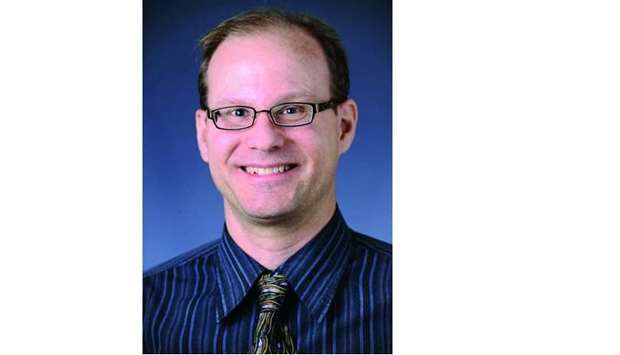A Qatar Foundation (QF) partner university is leading efforts to develop a pilot programme in Museums Telehealth Art Therapy to address the symptoms of depression, anxiety, and stress among children in Qatar.
One of the themes of the project – led by Weill Cornell Medicine-Qatar and funded by QF's Qatar National Research Fund – will focus on is national identity.
In collaboration with the National Museum of Qatar (NMoQ), the project will use the museum’s artifacts to offer children virtual opportunities to explore their history and roots, while also aiming to counteract some of the effects of social distancing and isolation.
“Telehealth refers to seeing a doctor or healthcare professional using digital means. In therapy, telehealth sessions are done through video conferencing allowing psychiatrists and therapists to provide services to patients virtually,” said, Dr Alan Weber, professor at Weill Cornell Medicine-Qatar.
Led by Prof Weber, an arts-in-health specialist, the project will bring together an international team of art psychotherapists, psychiatrists, and physicians in Qatar and the UK to conduct the research.
Michelle Dixon, art therapist at Sidra Medicine, also a member of QF, will serve as a co-principal investigator of the project and will facilitate the online art therapy sessions.
The initial group to benefit from this project will consist of adolescents at Sidra Medicine.
Art therapy is an exploratory process that uses art media as its primary mode of communication and is based on the belief that the creative process involved in the making of art is healing.
It involves the use of creative techniques such as drawing, painting, colouring, or sculpting to help people express themselves artistically and examine the psychological and emotional undertones in their art.
“Art therapy can be helpful especially if somebody is having difficulty verbalising their struggle,” explained, Dixon.“This is especially common in teenagers. They are often hesitant to talk about their feelings and art can be a more inviting method for them.”
Explaining how national identity is a key theme of the project, Prof Weber said,: “Exclusion and isolation are issues commonly faced by the youth of today. While isolation is a problem exacerbated by the ongoing pandemic Covid-19, exclusion is a much older one.
“Because of the rapid urbanisation of the country, many youth today feel disconnected from their past and ancestors. This is why we chose the theme of national identity; the collaboration with NMoQ will be very valuable in helping us bring this theme to life.”
Sahar Saad, Museum Development specialist, NMoQ, said, “We are delighted to be partnering with QF on this project that will allow us to use our resources to make a positive impact on children in Qatar.
“We are actively ensuring that accessibility and inclusion is at the forefront of NMoQ’s vision through making available a range of assistive technology, sensory backpacks, inclusive programing, and interactive displays."
Once the model has gone through the pilot phase, the team eventually hopes to deliver it to Syrian refugees in Turkey. The telehealth mode will be particularly useful in reaching refugee children that are in dire need of therapy but are often located in areas that are difficult to access.
In collaboration with the National Museum of Qatar (NMoQ), the project will use the museum’s artifacts to offer children virtual opportunities to explore their history and roots, while also aiming to counteract some of the effects of social distancing and isolation.
“Telehealth refers to seeing a doctor or healthcare professional using digital means. In therapy, telehealth sessions are done through video conferencing allowing psychiatrists and therapists to provide services to patients virtually,” said, Dr Alan Weber, professor at Weill Cornell Medicine-Qatar.
Led by Prof Weber, an arts-in-health specialist, the project will bring together an international team of art psychotherapists, psychiatrists, and physicians in Qatar and the UK to conduct the research.
Michelle Dixon, art therapist at Sidra Medicine, also a member of QF, will serve as a co-principal investigator of the project and will facilitate the online art therapy sessions.
The initial group to benefit from this project will consist of adolescents at Sidra Medicine.
Art therapy is an exploratory process that uses art media as its primary mode of communication and is based on the belief that the creative process involved in the making of art is healing.
It involves the use of creative techniques such as drawing, painting, colouring, or sculpting to help people express themselves artistically and examine the psychological and emotional undertones in their art.
“Art therapy can be helpful especially if somebody is having difficulty verbalising their struggle,” explained, Dixon.“This is especially common in teenagers. They are often hesitant to talk about their feelings and art can be a more inviting method for them.”
Explaining how national identity is a key theme of the project, Prof Weber said,: “Exclusion and isolation are issues commonly faced by the youth of today. While isolation is a problem exacerbated by the ongoing pandemic Covid-19, exclusion is a much older one.
“Because of the rapid urbanisation of the country, many youth today feel disconnected from their past and ancestors. This is why we chose the theme of national identity; the collaboration with NMoQ will be very valuable in helping us bring this theme to life.”
Sahar Saad, Museum Development specialist, NMoQ, said, “We are delighted to be partnering with QF on this project that will allow us to use our resources to make a positive impact on children in Qatar.
“We are actively ensuring that accessibility and inclusion is at the forefront of NMoQ’s vision through making available a range of assistive technology, sensory backpacks, inclusive programing, and interactive displays."
Once the model has gone through the pilot phase, the team eventually hopes to deliver it to Syrian refugees in Turkey. The telehealth mode will be particularly useful in reaching refugee children that are in dire need of therapy but are often located in areas that are difficult to access.

